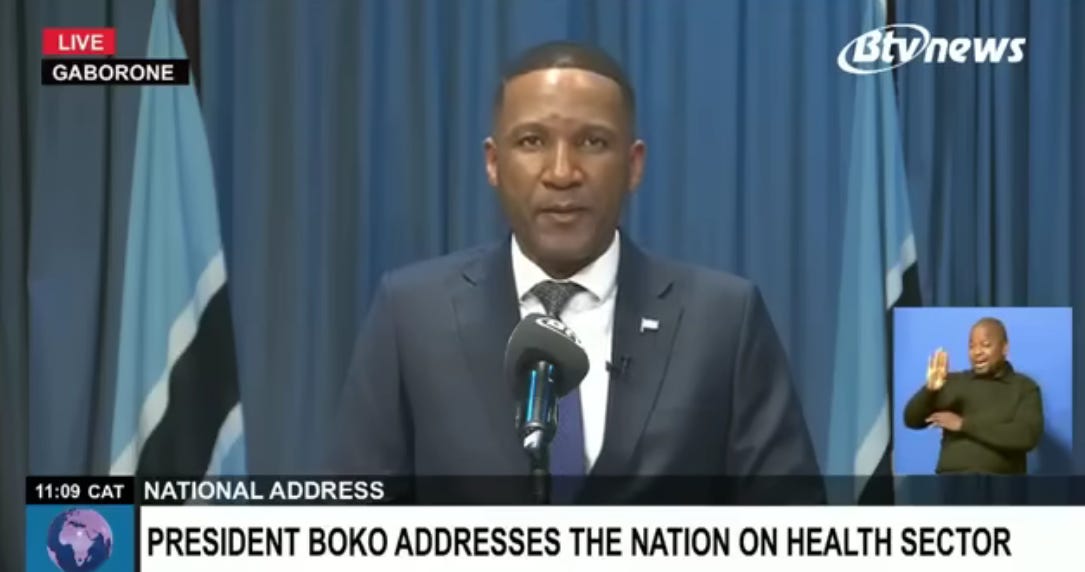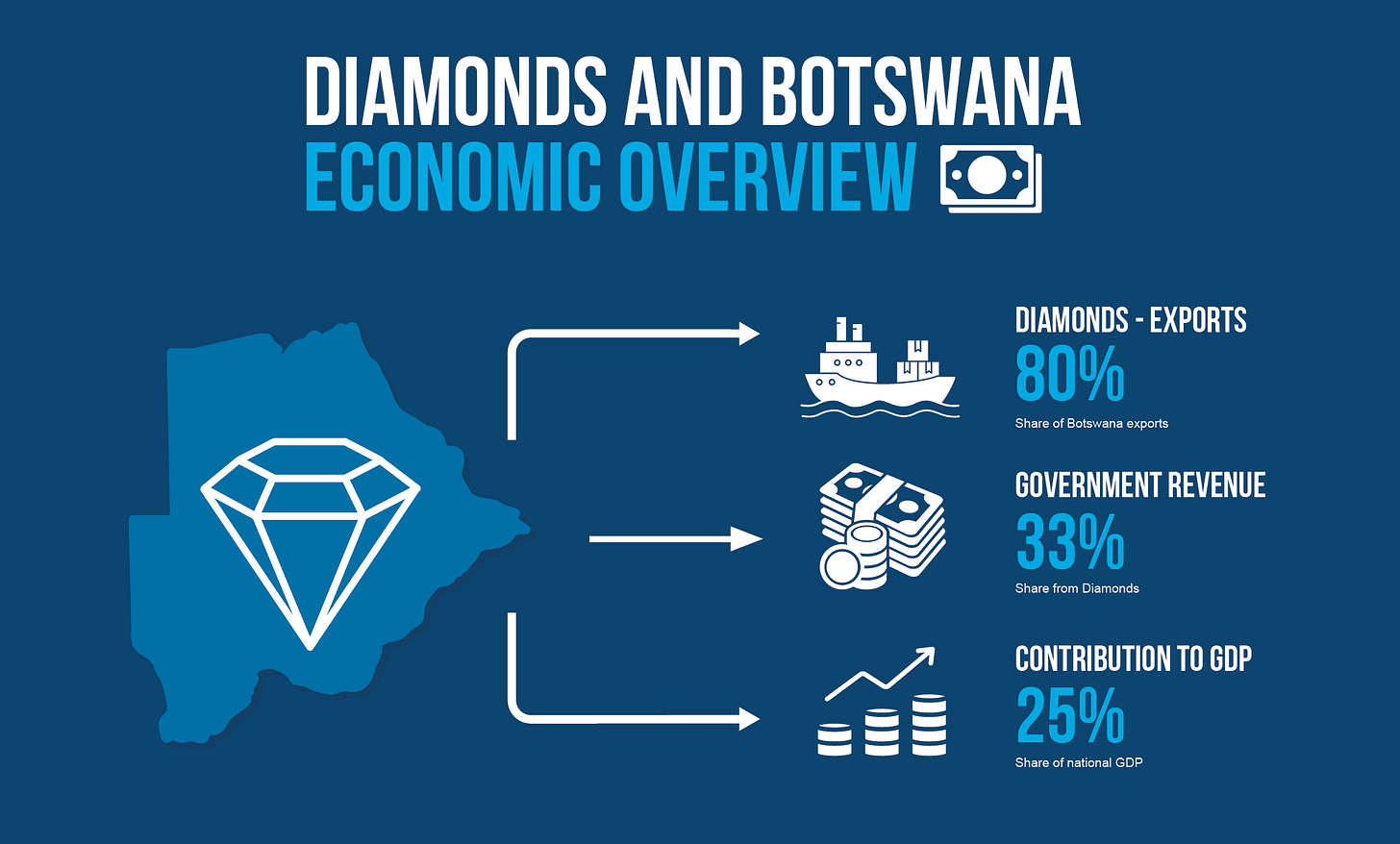When Diamonds Lose Their Shine: Botswana’s Health Crisis and the Cost of Overdependence
Chioma Nnamani
In August 2025, Botswana, long celebrated across Africa for its stable economy and strong public health systems declared a national public health emergency after hospitals began running critically low on essential medicines and supplies, forcing the suspension of elective surgeries. This was not due to a new epidemic or an outbreak of disease, but a downturn in diamond revenue which is Botswana’s economic lifeline.
Diamonds have been the backbone of Botswana’s economy for decades, accounting for nearly 80% of exports, one third of fiscal revenue, and a quarter of GDP. This heavy reliance on a single industry has left the country vulnerable to economic fluctuations. When global demand for diamond declined earlier in 2025, driven by the rise of lab-grown alternatives, the impact reached every corner of Botswana’s economy, including the health sector. With reduced revenue, hospitals and clinics faced severe shortages of essential medicines and supplies, disrupting treatment for chronic conditions such as hypertension, diabetes, and cancer.
In response, President Duma Boko, in a televised address declared a national public health emergency, describing the situation as a “failure of the national medical supply chain.” He attributed a huge part of the crisis to the Central Medical Stores (CMS), accusing the agency of inflating prices of medicine, sometimes as much as five to ten times their actual cost. According to President Boko, the CMS had quoted over 705 million pula for a year’s supply of essential medicines, while a task force’s evaluation of the same supplies placed the cost at under 80 million pula. The figures revealed the depth of inefficiencies and systemic failures with the country’s health procurement system.

To provide immediate relief, President Boko announced several emergency measures, including a temporary suspension of procurement restrictions.
“The Ministry of Finance has approved a waiver to bypass current citizen empowerment schemes that have contributed to cost escalations, and for the use of emergency procurement methods as provided in the Public Procurement Act to address this predicament the country is faced with.”
~ President Duma Boko
Lessons from Botswana’s Health Crisis
Botswana has made remarkable breakthroughs in public health response, especially in the fight against HIV. In 2025, Botswana became the first high HIV burden country to achieve the World Health Organisation’s “gold tier” status for eliminating mother-to-child transmission of HIV. The country’s success in HIV and primary health care has helped build its reputation as one of Africa’s most stable and capable health systems. The sudden shift from stability to a national public health emergency is a demonstration of how quickly even the strongest health systems can unravel.
A closer look at Botswana’s crisis reveals more than just depleted funds and mismanagement, it shows how overdependence on a single source of revenue can cripple strong systems. Across Africa, there are many examples of reliance on volatile commodity exports such as oil, copper, especially in health.
Angola, for instance, was forced to cut public spending when oil prices fell in 2020, creating enormous challenges for its health sector. Similarly, Zambia’s copper-dependent economy has repeatedly struggled to sustain consistent funding for essential health services as global prices fluctuate. These examples highlight the importance of diversification of revenue streams, because countries like Mauritius with diverse sources of revenue have fared better.
Since the declaration of a public health emergency in August 2025, Botswana has taken steps to stabilise its health supply chain. The government released 250 million pula in emergency funding to fast-track medicine procurement, and the military was deployed to distribute supplies to facilities nationwide. In October 2025, the United Arab Emirates delivered 91 tonnes of essential medicines and medical supplies, offering crucial short-term relief.
President Duma Boko’s plans to introduce a citizenship-by-investment programme which was unveiled at the 2025 United Nations General Assembly, shows Botswana’s commitment to reducing its dependence on diamonds and attracting foreign investment to stimulate other sectors of the economy.
As Botswana plans for recovery, its experience offers an important lesson to other African countries on how to avoid similar crises. The road ahead will require more than short-term fixes or emergency imports, it calls for a complete rethink of the way public resources are managed. While the crisis has exposed long-standing inefficiencies within the health system, it has also created a window of opportunity for meaningful reform.
Why This Matters
Across Africa, many countries continue to fund essential health services through revenues tied to commodities such as oil, gas, and minerals, sectors highly vulnerable to global price shocks. When these prices fall, it’s not just budgets that shrink, patients lose access to medicines, hospitals run out of supplies, and health workers are left to improvise in already strained systems.
The crisis in Botswana highlights the urgent need for African governments to diversify their economies, ring-fence health budgets from commodity fluctuations and invest in stronger, more transparent procurement systems, where health is not just protected by the market value of exports, but by sound governance and sustainable domestic financing.



